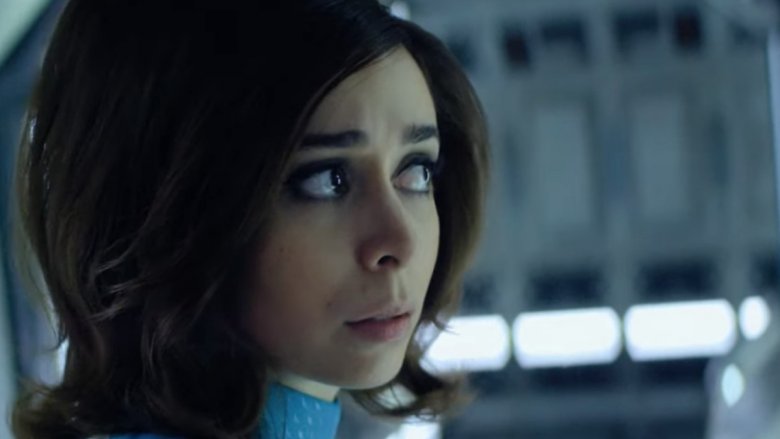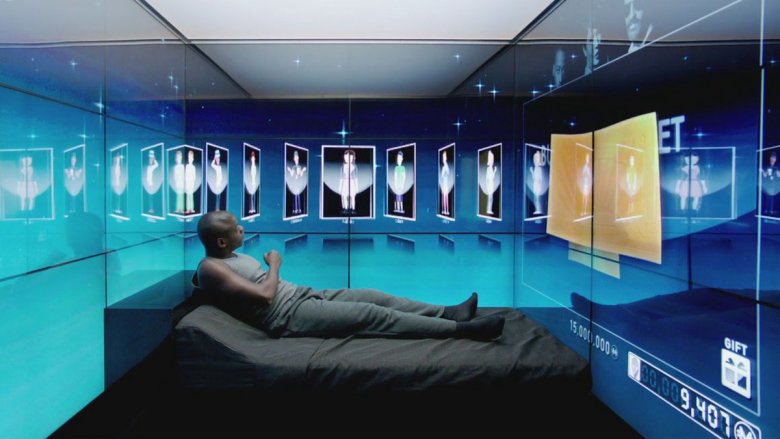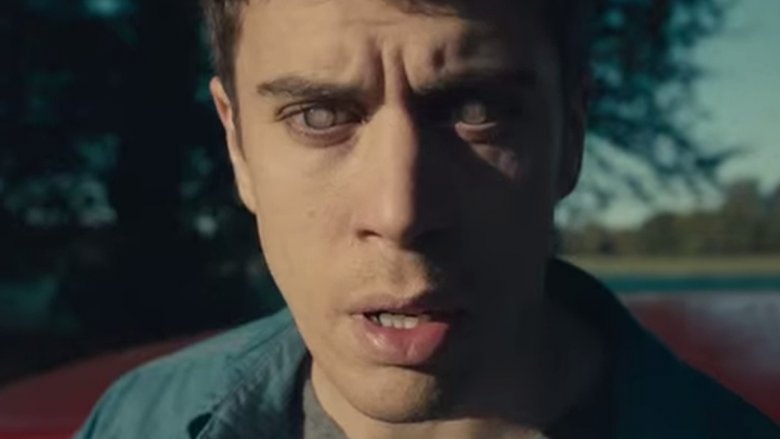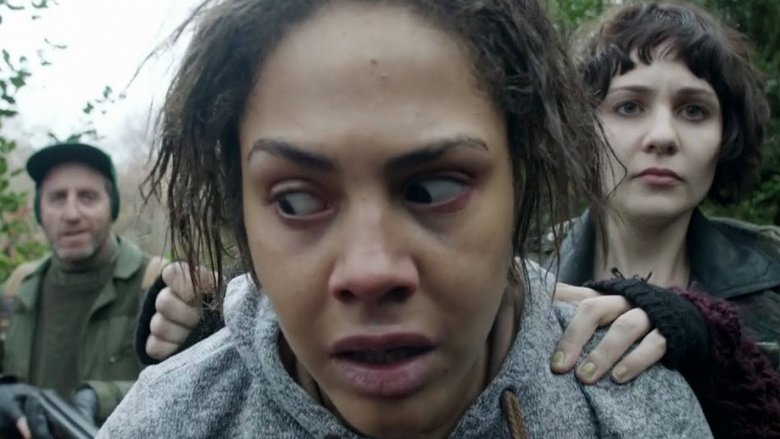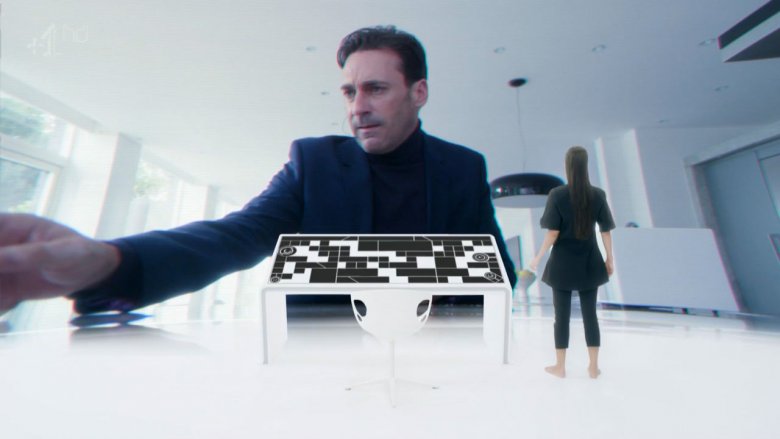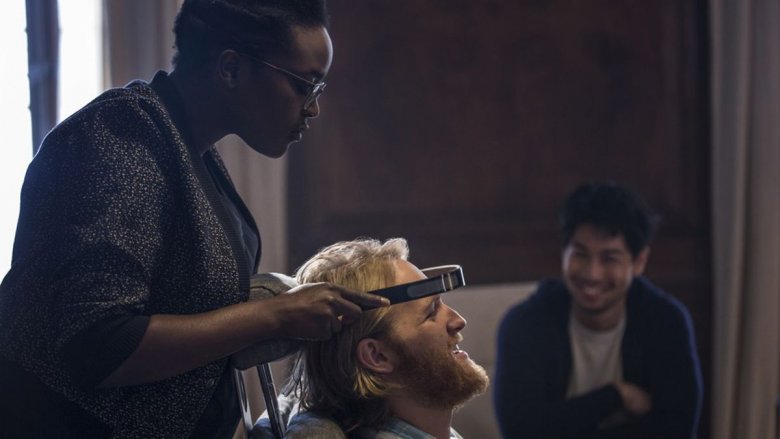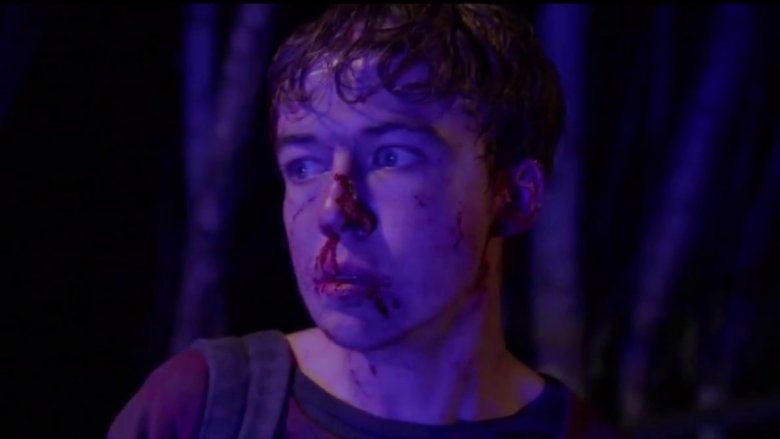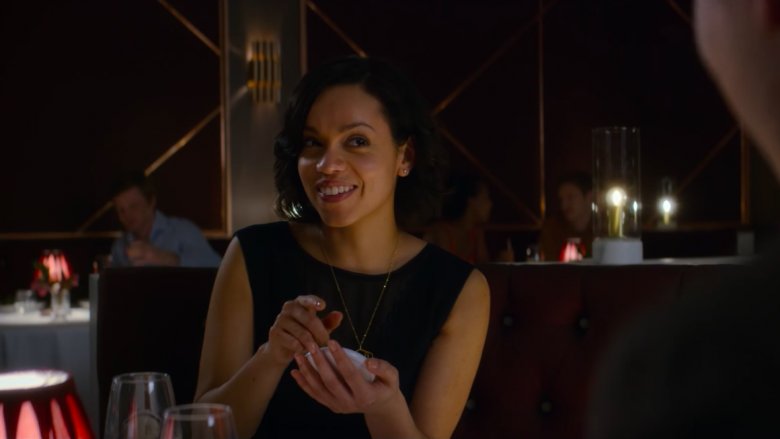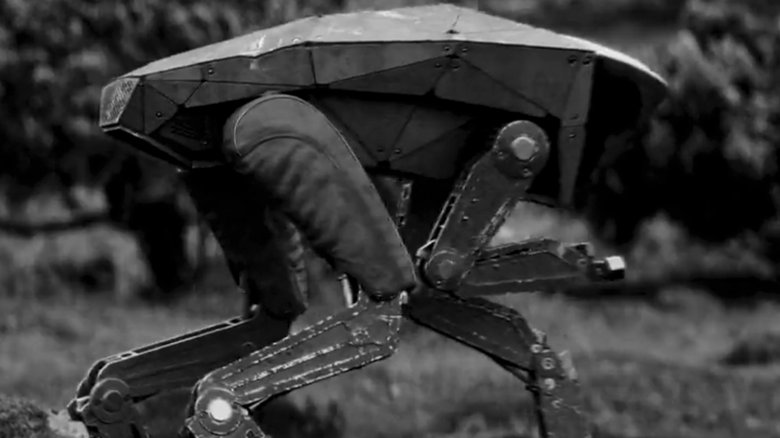Confusing Black Mirror Episodes Explained
If the cult classic The Twilight Zone was to have a modern program worthy of carrying on its twisted-yet-revelatory reputation, one of the top candidates would doubtless be Black Mirror. Filled to the brink with mind-bending sequences of enlightening horror and fear, the Netflix-hosted show has proven itself completely capable of leaving viewers in a state of mystified confusion that's laced with the discomfort of fear, dread, anxiety, and a whole host of other distressing emotions.
Sure, every once in a while you get an episode like the galaxy romping "USS Callister" or far too relatable "Nosedive" that leave you more or less satisfied and smiling. But the truth is, more often than not, Black Mirror leaves us just plain flummoxed. And, of course, that's part of what makes this show so special. It isn't just out for the big jump scares. Nor is it trying to simply keep you on the edge of your seat. The creators of this perplexing drama have hit on the perfect balance of entertainment and head-scratching bewilderment that often leaves us questioning technology, the future, and even our own humanity. Here are some of the most confusing episodes Black Mirror has aired to date, listed in order of their appearance.
Fifteen Million Merits
Starring Daniel Kaluuya (Get Out) as Bingham "Bing" Madsen, Fifteen Million Merits takes place in a world that combines concepts like "the rat race," the corruption of modern entertainment values, and the future of advertising. From riding bikes all day for work to environments that are literally covered with screens, to the chump-change rewards and forced entertainment of both the mind-numbing and sexual variety, this episode feels like it was designed to feel like a grown-up version of WALL-E.
Of course, things are thrown for a loop when Abi Khan (Jessica Brown Findlay) shows up at work and an infatuated Madsen works to get Khan out of the "rat race" and onto the pre-defined route to "stardom." But when this only serves to inadvertently push Khan into a career as an adult film star, it leads Madsen to hatch his plan for justice.
The episode is haunting throughout, but really it's in those closing minutes that the point of all of the insanity comes crashing down like a ton of bricks. As Madsen threatens suicide on live television and the judges, seemingly unruffled by the scenario, offer him a huge buyout for "his act," the man breaks down and sells out. From success through sexuality, violence, and self-loathing to selling out and being inundated with perpetual advertising, this episode is dripping with deeper messages.
The Entire History of You
Season 1 finale The Entire History of You centers around a husband who suspects his wife of infidelity and eventually finds his suspicions to be correct. Okay, big deal. This is the bread and butter of the drama genre. But wait, there's more.
The one big twist here? Everyone has had "grains" installed into their heads which record everything they see, say, and hear. The nifty new techno-gadgets also allow a user to replay their own memories in front of their own eyes or cast it onto a nearby screen. Of course, this ultimately leads to the main character, Liam (Toby Kebbell), forcing his wife, Ffion (Jodie Whittaker), to replay damning images of the affair, which he is then forced to watch in front of his own eyes.
Once again, taken on its own, the storyline is fairly benign and easy to digest. But the reason this one leaves everyone a bit off is particularly well demonstrated in the final moments of the episode. Liam, now living alone in a house filled with a host of memories (which he can still rewind and watch), finally rips out his grains in desperation, leaving us with the haunting question... is being able to play back perfect recordings of what you've seen really worth it? The resounding answer here is absolutely not.
White Bear
This one brings home the confusion factor in a unique way, as we are all dropped into an unknown location where Victoria Skillane (Lenora Crichlow) suddenly wakes up with no memory. Seen through the eyes of the terrorized Skillane, the episode follows the character as she is hunted through what appears to be a post-apocalyptic world while a group of "onlookers" watch her and stoically take pictures. Seriously, this one is bonkers.
But, of course, as is always the case with Black Mirror, it's all for a purpose. Ultimately Skillane is surprised to find out that she's actually part of an elaborate "torture program" in which she isn't the victim, but rather the offender... and the entertainment. Skillane was an accomplice in the murder of a child, and her punishment is to endlessly have her brain wiped and then be put through a series of terrors for the entertainment of the masses.
It really hits home because as the credits roll, it slowly becomes clearer that the point of the episode isn't really just about whether Skillane is a victim. Nor is it even simply about the "appropriate" way to punish a felon. One of the darkest points at the root of this episode is to highlight how quickly groupthink will lead us to accept the appalling treatment of another human being.
White Christmas
One of the most popular episodes of the entire show, the season 2 finale White Christmas introduced a whole new batch of bewildering concepts into the Black Mirror-verse. From a new use of the "artificial eyes" concept to the introduction of "cookies" or digital replicas of a person, the episode is laced with all sorts of abstract theories that wrinkle your brain.
Once again we're shown a misuse of the ability to "see" through another person's eyes during the early parts of the episode, when Matt Trent (Joe Hamm) and his group of voyeurs accidentally lead their friend into a sexual liaison that ends in death. But then things continue to get morally problematic as Trent uses his testimony to coax a digital replica or "cookie" of Joe Potter (Rafe Spall) to confess to a murder, thus convicting his real-life equivalent.
The truly difficult part to process here is the new concept of "digital slavery" suggested by an automated copy of a person. The "breaking" of a digital person to do the will of their owner has slavery overtones written all over it. And then, as the episode ends, we're once again left grappling with the concept of Spall's cookie literally left for millions of years in torturous isolation, highlighting the ultimate point — the worthless valuation of this new form of digital life simply because it isn't seen as "equal."
Playtest
Playtest remains possibly one of the most confusing of all the Black Mirror episodes thus far. Taking place in layers upon layers of alternate reality, this one takes a bit of unraveling just to make sense of it. The episode focuses on Cooper Redfield (Wyatt Russell), a wandering world traveler who playtests a new virtual reality system that is literally inserted into the back of Redfield's neck. He is then left in a giant mansion to stay and test a horror game for as long as he can before giving up.
However, the one little detail that quickly gets swallowed up in the events of the episode is the fact that Redfield takes out his phone before the playtest starts in spite of strict orders to keep it off, and, of course, as soon as the test starts, he receives a call. The episode then follows Redfield through the game, which begins glitching, until Redfield wakes up back in the playtest room where he received the computer chip in his neck. But we aren't back in reality yet, Toto. Redfield heads home, only for the episode to end with yet another jump back to the playtest room, where we find Redfield dead after a game malfunction due to interference from his phone. While not one of the more thought-provoking episodes, Playtest certainly had some great twists, and introduced the concept of advanced VR into the show as well.
Shut up and dance
Shut up and Dance follows a series of characters who begin receiving text messages from an anonymous number blackmailing them to commit strange, unsavory acts. The main characters are Hector (Jerome Flynn), who is caught hiring a prostitute, and Kenny (Alex Lawther), who is filmed masturbating. Petrified at the thought of this unknown antagonist revealing information to their friends and family, they begin to do whatever they're told, from delivering cakes to robbing banks... and worse. The episode ends with Kenny literally fighting another man to the death in the woods. The confusing part of all of this, though, was the apparently over the top fear of being blackmailed. For the entire episode, we're made to pity Kenny as he's driven to more and more horrible actions, all the while wondering how robbing a bank or killing a person is better than being seen masturbating.
But once again in the closing minutes the curveball comes, and this time it's a particularly nasty one. Kenny wasn't just masturbating, he was viewing child pornography. The final takeaway is how it leaves one struggling with that same dismal question of how to determine an "appropriate" punishment for someone... and how quickly we all fall into that punishment groupthink mentality in the first place.
Crocodile
A straightforward yet just plain confusing episode, Crocodile follows the unpleasant story of Mia Nolan (Andrea Riseborough), who helps her friend Rob (Andrew Gower) dispose of a body after he accidentally kills a cyclist while they're driving down the road. Fifteen years later, Nolan has supposedly moved on from the murder, but Rob hasn't. When he threatens to confess, a truly terrifying version of Nolan emerges as she shows how numbed she has become through the whole affair by murdering her friend to keep things quiet.
From there, the episode spins out of control as Nolan continues to go on a string of merciless, cold-blooded murders, all in an fruitless attempt to keep things "in the dark." Of course, once you've murdered five people in random places, it gets hard to keep everything covered up, and the episode ends with Nolan being placed under arrest as giant crocodile tears flow down her cheeks. While this is a tougher one to straight up "explain" — no one even seems to agree on the meaning of the title, let alone the message — it seems that, apart from straight up disturbing his audience, director John Hillcoat was attempting to demonstrate the idea that sometimes the removal of an initial inhibition releases a person from their moral underpinnings. In other words, once you're guilty anyway, what's stopping you from doing something again?
Hang the DJ
Immediately following Crocodile came Hang the DJ, which was surprisingly lighter in its tone considering the name. The episode, which brought the concept of digital replicas of people into play once again, is set in a fictional world where people enter a dating system where they're paired up with prospective partners until the computer decides on their "ultimate compatible other." The episode follows Amy (Georgina Campbell) and Frank (Joe Cole), who are initially paired up for 12 hours before going on two very separate journeys through the system. When they're finally told who they're going to be matched up with, they decide instead to rebel and run away together instead.
That's the point where it's revealed that they're actually digital replicas of themselves in a simulation (e.g. a dating app) where 998 out of 1000 times they rebelled against the system and ran away together. In other words, they're 99.8% compatible. This one is a fun one to deconstruct as it defies an easy explanation. After all, it's the very act of rebellion "against the system" — something that the audience is clearly guided towards rooting for — that ultimately helps the computer to calculate who's right for who within its own system. It's the ultimate battle royale between matchmaking and love at first sight.
Metalhead
In a rather stark deviation from the lengthy, brain-warping deeper concepts of many of the other episodes, Metalhead veers off into a short and simple — yet stressful — romp through a black-and-white, post-apocalyptic wasteland filled with killer mechanical dogs. The storyline focuses squarely on the survival of Bella (Maxine Peake) as she winds her way through a wilderness, trying to avoid death by the hunting metallic canines, before finally committing suicide when all hope is lost.
While it's been praised for its acting, directing, and cinematography, the storyline of Metalhead is painfully straightforward in its delivery, allowing little room for embellishment, and revealing virtually nothing to go on beyond what we're shown along with a few dim hints at other human survivors and the one haunting reveal at the end that all that they were searching for was a box of teddy bears for a dying child. It's an odd one, because in many ways this episode can't be unpacked much further than what it gives us. But the black-and-white effect and the tragic ending help to drive home the one, poignant message of hopelessness that was clearly front and center on director David Slade's mind.
